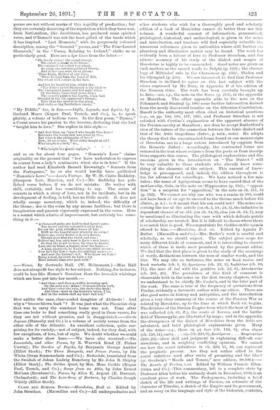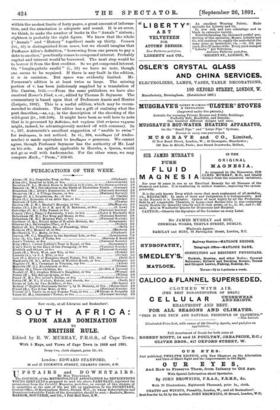other students who wish for a thoroughly good and scholarly
edition of a book of Herodotus cannot do better than use this volume. A wonderful amount of information, grammatical, philological, historical, and archteological, is given in the notes and introduction, and teachers will find especially valuable the numerous references given to authorities where still further ex- planatory and illustrative matter may be found. The work has evidently been a labour of love to Professor Strachan, and the minute accuracy of his study of the dialect and usages of Herodotus is highly to be commended. Good notes are given on such matters as the sacred roads to Delphi (p. 126) ; the chrono- logy of Miltiades' rule in the Chersonose (p. 133) ; Phidon and his Olympiad (p. 200). We are interested to find that Professor Strachan is inclined to agree on this last subject with the views expressed by Mr. Bury, in Appendix D of his edition of the Nemean Odes. The work has been carefully brought up to date,-see, e.g., the note on the Soros (p. 213), in the appendix on Marathon. The other appendix adds to the note on the Polemarch and Strategi (p. 188) some further information derived from the newly discovered treatise on the Athenian Constitution. Busolt is the authority most often cited on historical questions (e.g., on pp. 100, 166, 187, 199), and Professor Strachan is not satisfied with Curtius's explanation of the apparent absence of the Persian cavalry at Marathon ; nor does he accept Rutherford's view of the nature of the connection between the Ionic dialect and that of the Attic tragedians (Intro., p. xxix., note). He adopts the theory that the uncontracted forms found in our manuscripts of Herodotus are to a large extent introduced by copyists from the Homeric dialect : accordingly, the contracted forms are restored in the text where evidence from the poets or from inscrip- tions supports this course. The philological explanations and dis- cussions given in the introduction on " The Dialect " will be very valuable to those students who already know some- thing of the elements of the subject. This amount of know- ledge is presupposed, and, indeed, the edition throughout is too far advanced for schoolboys. We have noticed a few mis- takes : the name of Agrigentum seems to have ousted that of the mother-city, Gela, in the note on 'Hippocrates (p. 116) ; " opposi- tion " is a misprint for " apposition," in the note on ch. 111, 15 (p. 192). We cannot see why one who was a yeaefas in 480, could not have been of an age to succeed to the throne much before 455 (Intro., p. x.) : is it meant that his son could not ? The notes con- cerning the use of the article (on ch. 5, 10; 24, 3), the infinitive in dependent clauses of or. obl. (on ch. 84, 6), Erna (on ch. 54, 7), may be mentioned as illustrating the care with which delicate points of scholarship are treated. But it is difficult to choose where there is so much that is good. We congratulate Dr. Geddes on the epoibeia offered to him.-Herodotus, Book vii. Edited by Agnata F• Butler. (Macmillan and Co.)-Mrs. Butler's work is careful and scholarly, as we should expect. The subject gives scope for many different kinds of comment, and it is interesting to observe which of these is made most prominent by the present editor. We find that the first place is given to the study of the meanings of words, distinctions between the uses of similar words, and the like. We may cite as instances, the notes on &E/at woliesv and BEM& wotleirki (ch. 1, 6), bpile4tevot (ch. 22, 5), azafIciAAcev (ch. 10, 71), the uses of ter6 with the genitive (ch. 22, 6), dhVo¢pove'av (ch. 205, 20). The prevalence of this kind of comment is observable both in the notes on the first twenty chapters, which we understand to be chiefly Mr. Cooke's, and in the later part of the work. The same is true of the frequency of quotations from Pindar, evidently a favourite author with our editor. There are also good notes on history and antiquities, and the introduction gives a very clear summary of the course of the Persian War as related by Herodotus, up to the time at which Book vii. begins. The divisions of the Persian Empire from which the host of Xerxes was collected (ch. 61, ff.), the route of Xerxes, and the battle- field of Thermopylte, are illustrated by maps ; and in the appendix the divergences of the dialect of Herodotus from the Attic are tabulated, and brief philological explanations given. Many of the notes--e.g., those on IA teen (ch. 149, 8), Ors ernuev (ch. 150, 11), Tatirp . . . slut (ch. 220, 6), )30vA6asvov . . . Zrairrorrinw (220, 25)-show skill and judgment in explaining difficult con- structions, and in weighing conflicting opinions. We cannot see how the aorist infinitives in ch. 220, 15, 16, can represent the prophetic present. Are they not rather allied to the aorist infinitive used after verbs of promising and the like ? (cf. Goodwin's " Moods and Tenses," new edition, 98-100.) - The Annals of Tacitus, i.-vi. Edited by William Francis Allan. (Ginn and Co.)-This commentary, left in a complete state by Professor Allen before his untimely death in beeember, 1889, is an excellent piece of work. The Prolegomena, including a brief sketch of the life and writings of Tacitus, an estimate of the character of Tiberius, a sketch of the Empire and its government, and an essay on the language and style of the historian, contains, within the modest limits of forty pages, a great amount of informa- tion, and the annotation is adequate and sound. It is an error, we think, to make the number of books in the "Annals" sixteen ; eighteen is probably the right figure. We know that the whole ( Annals " and "History" together) made up thirty. Versura (vi., 16) is distinguished from usura, but we should imagine that Professor Allen's definition, " borrowing from one person to pay a debt to another," practically comes to compound interest. Probably capital and interest would be borrowed. The next step would be to borrow it from the first creditor. So we get compound interest. On " longinquitate exsilii " (i., 53) we have no note, though one seems to be required. If there is any fault in the edition, it is in omission. But space was evidently limited. Mr. Furneaux's edition is at least twice as large. The missing portion of v. has been judiciously supplied by a translation of Dio. Cassius, lviii.—From the same publishers we have also received Homer's Iliad, v.-vi., edited by Thomas D. Seymour. The commentary is based upon that of Professors Ameis and Hentze (Leipsic, 1882). This is a useful edition, which may be recom- mended to students. The editor has a gift of realising what the poet describes,—as, e.g., in the description of the shooting of the wild-goat (iv., 106-108). It might have been as well here to note that 8v is governed by Of/Dtisei, not iroxbects (671.2, enripspio roxncras might, indeed, be advantageously marked off with commas). In v., 597, Autenrieth's excellent suggestion of "unable to swim" for ItirdAaavos, is not noticed. In vi., 394, aroAacopos (of Andro- mache) is made equivalent to iirtd6wpos = generous. We cannot agree, though Professor Seymour has the authority of Mr. Leaf on his side. An epithet applicable to Hecuba, a Queen, would not go so well with Andromache. For the other sense, we may compare /Esch., " Prom.," 559-60.



































 Previous page
Previous page